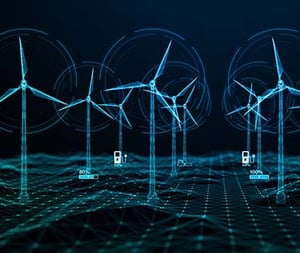Software & wind energy: know your IP options
 Patenting is now possible more often than you think
Patenting is now possible more often than you think
Just like in most industries, digitalisation is increasing in the wind energy sector. Good examples of software that provide energy gains or cost savings are already available on the market. But what if you develop a software solution? Will you be able to protect it? After all, the law does not permit the patenting of software as such. However more is possible than you might think and it can be very worthwhile patenting your software.
Software is subject to copyright and this already offers a limited amount of protection but with a patent you are able to get broader and thus better protection. On account of a legal provision, the software however needs to be of a sufficiently technical nature to qualify for patent protection.
Technical impact
If you are the inventor of a new and inventive physical product for generating wind energy, then this is clearly a technical solution. The same does not necessarily apply in the case of software. A program that processes customer data, sends invoices or collects data usually does not fall under the category of a technical solution to a technical problem and therefore cannot be protected by a patent. Under certain circumstances it is nevertheless possible to obtain a patent on software. One of the requirements for this is that the software must have a technical impact, or in other words have an impact in the physical world. For example, an application that adjusts the position of the blades in relation to the direction and speed of the wind. Or artificial intelligence that learns to recognise, via photos, when corrosion is developing on the mast or other parts. This makes it possible to carry out maintenance in good time. In other words: a technical solution for a technical problem, with an impact in the physical world.
Ahead of the competition
This means that the average software innovation in the wind energy sector is patentable. But what is the advantage? One important advantage is that you offer something that someone else does not have. In a tendering process this will give you an advantage over your competitors. Think, for example, of an application that allows you to carry out maintenance remotely. This is faster and cheaper for your customer and makes you more attractive as a supplier.
Licence
It is not only personal use that makes a patent worthwhile. With the patent you are in control; you determine who is allowed to use your innovation. You can do this, for example, by licensing the software. This gives you control over the parties that work with your innovation and you also reap the financial benefits.
Expertise
Even though a great deal is possible, applying for a patent on software continues to be complex. Research into the novelty of the solution and a watertight description of the innovation are required. The novelty and inventive step must be clearly evident. You should therefore always call in an expert when you are thinking about patenting software applications and, together with a patent attorney, ensure that the patent will benefit you.

About the author
My father was a successful inventor and I have been raised with technical creativity throughout my childhood. However, I always knew that was not enough for me. I like language, law, business &...
More about Walter >